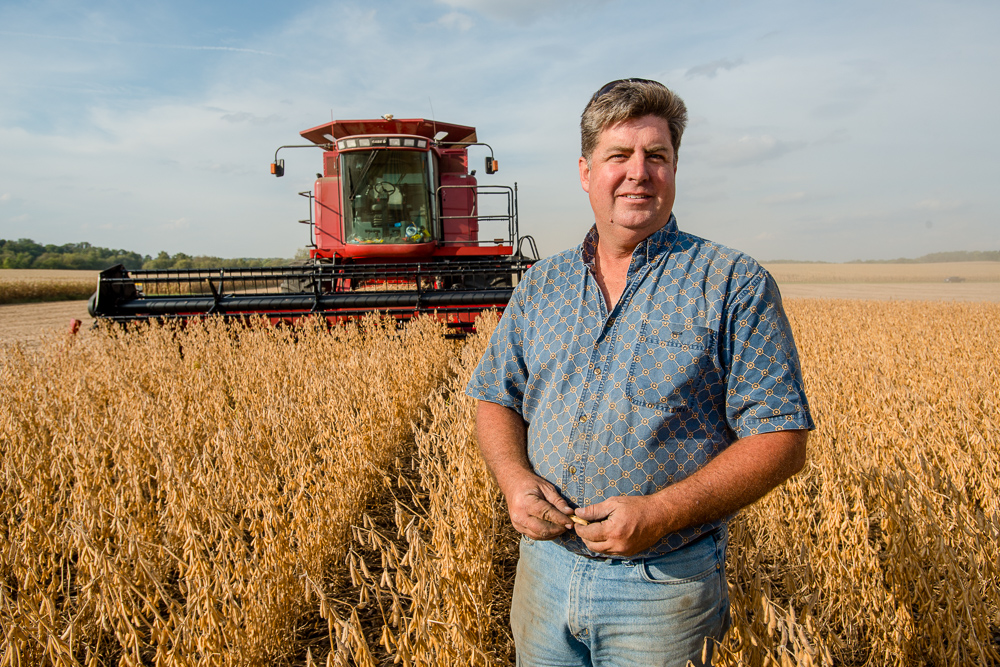
Dave Walton pauses for a portrait during harvest in this file photo. Members of the Iowa Biodiesel Board celebrated the EPA's decision to deny 54 of 68 small refinery exemptions during their annual meeting this week. The board hopes that demand for soybeans will be restored. (Joseph L. Murphy/Iowa Soybean Association)
Biodiesel board keeping close eye on RFS announcement
September 17, 2020 | Bethany Baratta
The recent announcement from the Environmental Protection Agency (EPA) to deny 54 of 68 pending “gap” small refinery exemption petitions to the Renewable Fuel Standard was widely touted as a win during the Iowa Biodiesel Board’s annual meeting this week. However, the industry says it will closely monitor the follow-through of that announcement and the remaining 14 petitions awaiting scoring from the Department of Energy before being passed along to the EPA.
“It’s important to keep an eye on this because the EPA has a history of not going all the way on some of these issues,” said Dave Walton, a director serving on the Iowa Biodiesel Board (IBB). “And as long as there are outstanding waivers, there’s always a potential for shenanigans.”
The denial of the waivers stem from petitions dating from 2011 to 2018 and made no mention of the 31 waivers being considered for the 2019 and 2020 compliance years.
Coordinated efforts
The EPA’s announcement was a result of the coordinated efforts at the state and national levels to pressure EPA and the administration to deny the waivers and apply a ruling from the U.S. Court of Appeals for the 10th Circuit nationwide, Walton said.
Four groups of which Walton is a board member—Iowa Biodiesel Board, National Biodiesel Board, Iowa Soybean Association and American Soybean Association—joined forces, asking Senator Joni Ernst, Senator Charles Grassley, Iowa Governor Kim Reynolds and Iowa Secretary of Agriculture Mike Naig to help champion the cause.
“It’s really satisfying to see groups that I’m involved in come together and rally behind one specific thing and get a positive result for Iowa farmers and U.S. farmers in general,” Walton said.
It’s a culmination of efforts from Walton, too. He’s taken his concerns about the gap-year waivers and the losses those provide to farmers and producers to the statehouse and on to Capitol Hill. He authored an op-ed that was recently featured in the Cedar Rapids Gazette. Through his involvement with ASA, Walton was part of a small group who had a phone call with EPA Administrator Andrew Wheeler.
“This announcement was a great follow-through from those combined efforts,” Walton said.
Denying the gap-year waivers means restoring demand for soybeans in the state. Iowa ranks first in the nation in biodiesel production, producing 345 million gallons of biodiesel in 2019.
It means continued support for soybean prices in the state. Biodiesel increases the price of soybeans by about $1 per bushel, according to recent studies.
“For me, this means an extra $62 or $63 per acre, but it means hundreds of millions of dollars for Iowa farmers,” Walton said. “It’s a big deal.”
Senator Ernst joined the IBB meeting virtually, promising to track the waivers and keep the pressure on the administration and EPA in restoring the Renewable Fuel Standard (RFS).
“Even though we have had some really big wins, anything surrounding the RFS we always have to be vigilant,” she said.
Back